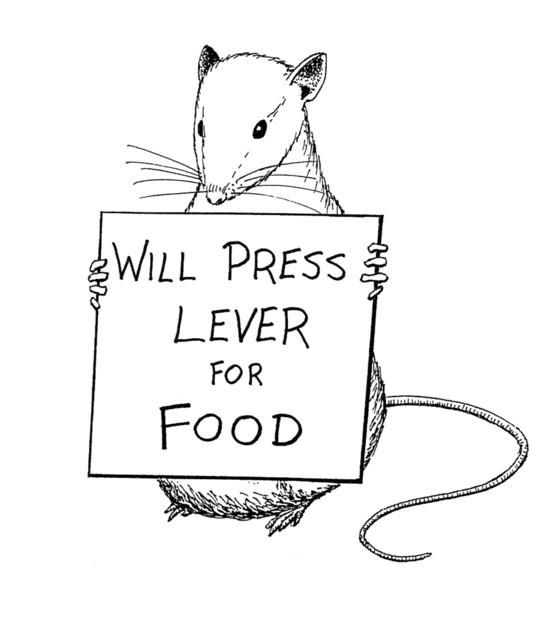Posts tagged knowledge
Behaviorism: Not As Dead As Previously Thought
0 It’s interesting how the situation in which you learn plays a part in the process. I learned all about behaviorism, cognitivism, and to some extent constructivism in undergrad school, and was it ever boring! I instantly shoved that knowledge in the “Save this until the final exam then purge it” section of my brain. Granted, I’m not proud of this attitude I used to have toward learning as an undergrad student, and my end goal was just getting the generals out of the way so I could take the classes I actually wanted.
It’s interesting how the situation in which you learn plays a part in the process. I learned all about behaviorism, cognitivism, and to some extent constructivism in undergrad school, and was it ever boring! I instantly shoved that knowledge in the “Save this until the final exam then purge it” section of my brain. Granted, I’m not proud of this attitude I used to have toward learning as an undergrad student, and my end goal was just getting the generals out of the way so I could take the classes I actually wanted.
Yet now, as I’ve been restudying and reexamining the major theories of learning — i.e. behaviorism, cognitivism, and constructivism — I find it interesting how knowledge that once seemed so non-applicable suddenly has a deeper meaning, and you have a reason to learn and comprehend it, when it directly relates to your career.
I’ve been reading Burton, Moore, & Magliaro (1996), a basic primer on behaviorism and how it relates to instructional technology. Behaviorism is often dismissed as an “outdated” theory, yet its principles are still highly relevant. A couple things have occurred to me. One is that even B.F. Skinner wrote that “knowledge is action.” In other words, the behaviorist view isn’t one of passive absorption of knowledge, though this is a common misconception. It is one where the learner actively engages the world around him, and learns through experience (p. 9). The emphasis is on all the active responses of the learner, and validation of learning occurs only when action has taken place. How is this focus much different than what we currently practice in our schools? We require engagement from our students. An idle student learns nothing. Also, behaviorism is very relevant to modern instructional design, particularly the systems approach. Needs assessments and task analyses are necessarily behaviorist in design. We can’t as easily gauge cognitive patterns or assess thought processes.
Rabinowitz & Thaw (2005) provides further illumination on the behaviorist perspective’s relationship to educational technology. Skinner believed that machines are useful for instruction, since students should immediately know whether they are doing something correct or not, and receive appropriate rewards for right answers (p. 50). This is an area in which computers are quite proficient, and they are only becoming more adept at delivering instantaneous feedback to increasingly larger numbers of students at once. A study of behaviorism is useful when evaluating computer-based teaching methods, that much is clear.
On the other hand, Rabinowitz & Thaw (2005) suggest that theoretical perspectives have undergone an “evolution” or “progression” (p. 49). I’m not sure I agree with this. If we are progressing, what are we progressing toward? At its core, particularly in the realm of science, evolution represents adaptive change, not advancement. Approaching theoretical perspectives from a non-progressive angle may provide a more useful framework, because we are not tempted to dismiss the advantages older theories provide simply because we feel we’ve moved on to something better. I think perceiving new theories as a progression undermines the point of learning past theories in the first place, because we may be less inclined to explore the benefits they once and still could bring to the ever-changing field of educational technology.
I will be paying a lot more attention to theories of the past and exploring the effects they have had upon our current knowledge of instructional technology, and the advantages and insights they may yet bring to the table, particularly as they relate to computer-based instruction. Reopening a study of behaviorism has particularly been useful for me.
Lastly, this past week I was able to lead a lively discussion about a possible shift in epistemological perspectives that is underway. Namely, how knowledge seems to be shifting from being the sole domain of academics and scholars to community-approved in resources such as Wikipedia, and how the Internet is facilitating this shift. This was quite an insightful discussion which demonstrated to me just how powerful the effects of social media have been. If the credibility or weight of academic knowledge (such as in Encyclopedia Britannica) starts carrying the same weight as a Wikipedia article — as many of our students today seem to think — how will this affect the ways K-12 and higher education schools teach students to research? It is possible that citing Wikipedia will not be as taboo in the future as it is now. Since students are using the Internet for learning at younger and younger ages, it’s becoming increasingly necessary to teach our students proper research skills early on, so they understand that even though there may be a shift of what’s “acceptable information,” it does not necessarily mean the information is correct.
References
Burton, J. K., Moore, D. M., & Magliaro, S. G. (1996). Behaviorism and instructional technology. Handbook of Research for Educational Communications and Technology, 46–73.
Rabinowitz, M., & Thaw, E. (2005). Psychology, instructional design, and the use of technology: Behavioral, cognitive, and affordances perspectives. Educational Technology, 45(3), 49-53.
Reflections on Theory and Knowledge
0I’ve been reading about theories of knowledge and learning, and it’s been a sometimes frustrating but mostly intriguing experience. I have to admit, I’ve never been good with theories. Not because I don’t like to think, but because I don’t think my cognitive faculties are as elevated as the great thinkers I should be appreciating. But I’ve already come to realize that without a good, strong theoretical foundation, educational technology would be a dead-end.
Spector (2005) outlines four theoretical foundations for educational technology research: (1) learning psychology, (2) communications theory, (3) human-computer interaction (i.e. how humans learn from computed-based instruction), and (4) instructional design and development. Spector mentions an instructional theory I wasn’t familiar with beforehand: component display theory. The theory provides “guidelines for when control should pass from the instructional computing system to the learner and what should be included in that control” (p. 25).
I researched component display theory (CDT) a little more, and learned that the theory outlines four main forms of presentation: rules, recall, practice, and example. Learning itself consists of interaction between two areas: concepts (e.g. the facts and concepts one learns), and performance (i.e. how the learner uses the learned material). An important aspect of the CDT model is that it allows for the learner to control the instructional strategies that are used. In other words, the learner can adapt them to meet his own learning style.
This really interests me. The main area of focus in my job has traditionally been in human-computer interaction, and CDT applies quite directly to this foundation. Lately, I’ve been musing over how we can improve our district’s online learning. Currently, our only source of purely online learning is our self-directed professional development portal on Moodle, and as far as I’m concerned, it’s woefully inadequate. We do provide some good tutorials on our technology tools like the staff blogs and our employee leave reporting program, but proper assessments are not performed (I don’t count taking a simple five-question multiple choice quiz with the correct answer being the only “serious” one in the set an “assessment”). In other words, we’re not doing a very good job of evaluating learning. What’s more, our online instruction isn’t subject to revision. Our employees have very different preferences for learning. Our district does quite a good job of trying to accommodate them all, but we can be doing more. The way I see it, our staff should have their choice between online self-directed learning and live webinars. We could also explore the possibility of hosting an online conference for our district. Giving users multiple options is the key.
Dede (2008) offers an interesting article, in which he argues that we are seeing a shift in knowledge, from an organized system dictated by recognized experts, to community-oriented and collectively-approved. Wikipedia, which is one of the top 10 most visited sites on the Internet (according to Alexa), has blurred the line between academically-approved knowledge and information deemed acceptable by a worldwide social network. People have settled for knowledge that’s just “good enough” and no longer turn to the “sages on stage” delivering their incontrovertible wisdom from their ivory towers.
Two things occur to me. The first is that students must be taught how to recognize potentially false information, and how to recognize bias. They need to learn how to correlate any community-approved “knowledge” with other sources. Students use social media every day, creating their own communities and sharing knowledge that’s relevant to them. The Internet has made everyone a potential expert with a worldwide audience, and we must teach our students that not every self-proclaimed “expert” out there necessarily speaks the truth. There is still value to peer-review among established scholars, though even they have their own biases and are prone to misinformation. However, there is an undeniable gradient of reputability, and the established scholars still occupy the top. The question is, will they stay there?
The second is that we need to actually encourage students to form their own knowledge-sharing communities. Rather than sweep this under the rug, we can use this to our advantage. In my own district, I would like to see online student learning networks take hold and become hubs for the sharing of information, stimulate thoughtful inquiry, and help foster budding content experts. I think few teachers would deny there are many things they can learn from their own students. We need to encourage students to continue learning the things they are passionate about, and guide them to correspond more with established academicians. The world wide web has made it easy to reach out and communicate to anyone, and I think our schools are only beginning to explore the massive social possibilities the Internet has to offer.
References
Dede, C. (2008, May/June). A seismic shift in epistemology. EDUCAUSE Review, 80–81.
Giles, J. (2005). Internet encyclopaedias go head to head. Nature, 438(7070), 900-901. doi:10.1038/438900a.
